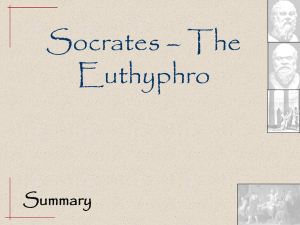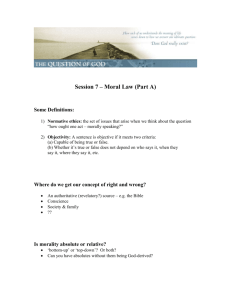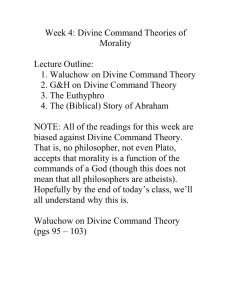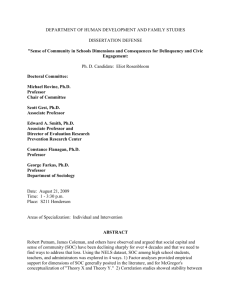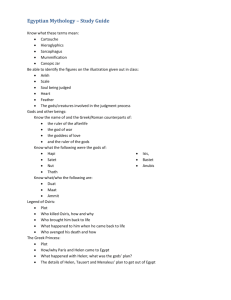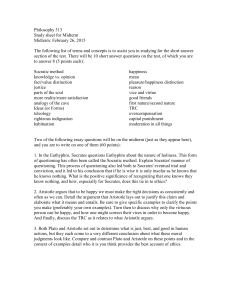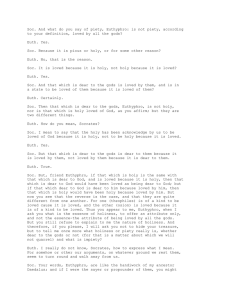EUTHYPHRO, by Plato translated by Benjamin Jowett, amended by
advertisement
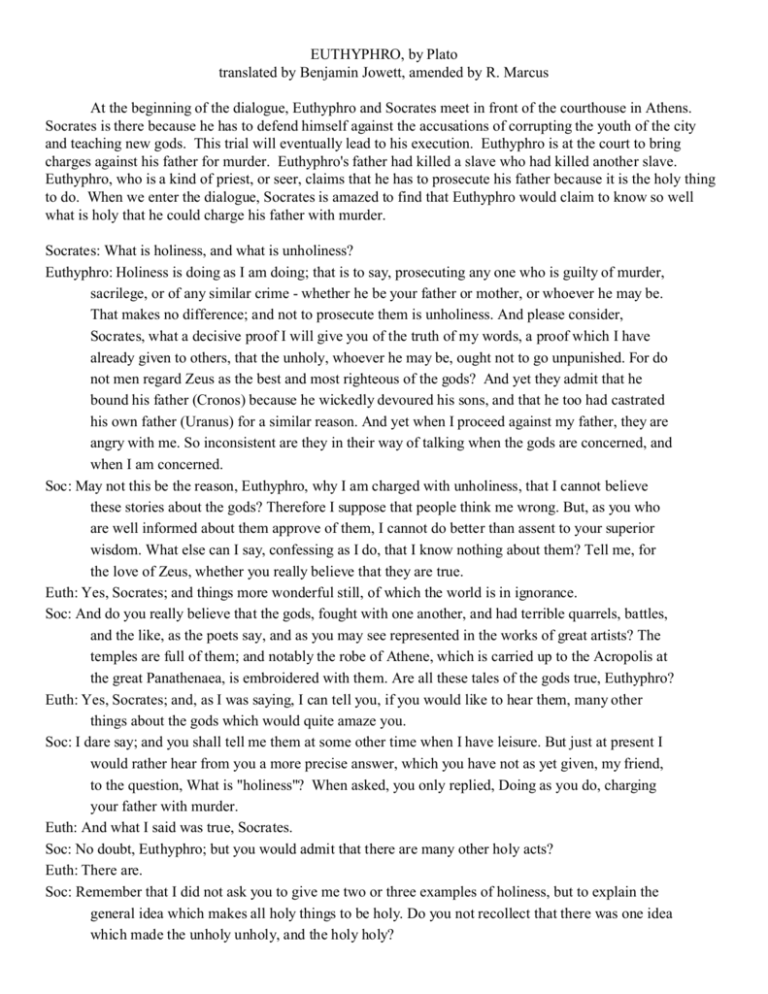
EUTHYPHRO, by Plato translated by Benjamin Jowett, amended by R. Marcus At the beginning of the dialogue, Euthyphro and Socrates meet in front of the courthouse in Athens. Socrates is there because he has to defend himself against the accusations of corrupting the youth of the city and teaching new gods. This trial will eventually lead to his execution. Euthyphro is at the court to bring charges against his father for murder. Euthyphro's father had killed a slave who had killed another slave. Euthyphro, who is a kind of priest, or seer, claims that he has to prosecute his father because it is the holy thing to do. When we enter the dialogue, Socrates is amazed to find that Euthyphro would claim to know so well what is holy that he could charge his father with murder. Socrates: What is holiness, and what is unholiness? Euthyphro: Holiness is doing as I am doing; that is to say, prosecuting any one who is guilty of murder, sacrilege, or of any similar crime - whether he be your father or mother, or whoever he may be. That makes no difference; and not to prosecute them is unholiness. And please consider, Socrates, what a decisive proof I will give you of the truth of my words, a proof which I have already given to others, that the unholy, whoever he may be, ought not to go unpunished. For do not men regard Zeus as the best and most righteous of the gods? And yet they admit that he bound his father (Cronos) because he wickedly devoured his sons, and that he too had castrated his own father (Uranus) for a similar reason. And yet when I proceed against my father, they are angry with me. So inconsistent are they in their way of talking when the gods are concerned, and when I am concerned. Soc: May not this be the reason, Euthyphro, why I am charged with unholiness, that I cannot believe these stories about the gods? Therefore I suppose that people think me wrong. But, as you who are well informed about them approve of them, I cannot do better than assent to your superior wisdom. What else can I say, confessing as I do, that I know nothing about them? Tell me, for the love of Zeus, whether you really believe that they are true. Euth: Yes, Socrates; and things more wonderful still, of which the world is in ignorance. Soc: And do you really believe that the gods, fought with one another, and had terrible quarrels, battles, and the like, as the poets say, and as you may see represented in the works of great artists? The temples are full of them; and notably the robe of Athene, which is carried up to the Acropolis at the great Panathenaea, is embroidered with them. Are all these tales of the gods true, Euthyphro? Euth: Yes, Socrates; and, as I was saying, I can tell you, if you would like to hear them, many other things about the gods which would quite amaze you. Soc: I dare say; and you shall tell me them at some other time when I have leisure. But just at present I would rather hear from you a more precise answer, which you have not as yet given, my friend, to the question, What is "holiness"? When asked, you only replied, Doing as you do, charging your father with murder. Euth: And what I said was true, Socrates. Soc: No doubt, Euthyphro; but you would admit that there are many other holy acts? Euth: There are. Soc: Remember that I did not ask you to give me two or three examples of holiness, but to explain the general idea which makes all holy things to be holy. Do you not recollect that there was one idea which made the unholy unholy, and the holy holy? Euth: I remember. Soc: Tell me what is the nature of this idea, and then I shall have a standard to which I may look, and by which I may measure actions, whether yours or those of any one else, and then I shall be able to say that such and such an action is holy, such another unholy. Euth: I will tell you, if you like. Soc: I should very much like. Euth: Holiness, then, is that which is loved by the gods, and unholiness is that which is not loved by them. Soc: Very good, Euthyphro; you have now given me the sort of answer which I wanted. But whether what you say is true or not I cannot as yet tell, although I make no doubt that you will prove the truth of your words. Euth: Of course. Soc: Come, then, and let us examine what we are saying. That thing or person which is loved by the gods is holy, and that thing or person which is hated by the gods is unholy, these two being the extreme opposites of one another. Was not that said? Euth: It was. Soc: And well said? Euth: Yes, Socrates, I thought so; it was certainly said. Soc: And further, Euthyphro, the gods were admitted to have enmities and hatreds and differences? Euth: Yes, that was also said. Soc: And what sort of difference creates enmity and anger? Suppose for example that you and I, my good friend, differ about a number; do differences of this sort make us enemies and set us at variance with one another? Do we not go at once to arithmetic, and put an end to them? Euth: True. Soc: Or suppose that we differ about magnitudes, do we not quickly end the differences by measuring? Euth: Very true. Soc: And we end a controversy about heavy and light by resorting to a scale? Euth: To be sure. Soc: But what differences are there which cannot be thus decided, and which therefore make us angry and set us at enmity with one another? I dare say the answer does not occur to you at the moment, and therefore I will suggest that these enmities arise when the matters of difference are the just and unjust, good and evil, honourable and dishonourable. Are not these the points about which men differ, and about which when we are unable satisfactorily to decide our differences, you and I and all of us quarrel, when we do quarrel? Euth: Yes, Socrates, the nature of the differences about which we quarrel is such as you describe. Soc: And the quarrels of the gods, noble Euthyphro, when they occur, are of a like nature? Euth: Certainly they are. Soc: They have differences of opinion, as you say, about good and evil, just and unjust, honourable and dishonourable: there would have been no quarrels among them, if there had been no such differences, would there now? Euth: You are quite right. Soc: Does not every man love that which he deems noble and just and good, and hate the opposite of them? Euth: Very true. Soc: But, as you say, people regard the same things, some as just and others as unjust, about these they dispute; and so there arise wars and fightings among them. Euth: Very true. Soc: Then the same things are hated by the gods and loved by the gods, and are both hateful and loved by them? Euth: True. Soc: And upon this view the same things, Euthyphro, will be holy and also unholy? Euth: So I should suppose. Soc: Then, my friend, I remark with surprise that you have not answered the question which I asked. For I certainly did not ask you to tell me what action is both holy and unholy: but now it would seem that what is loved by the gods is also hated by them. And therefore, Euthyphro, in thus chastising your father you may very likely be doing what is agreeable to Zeus but disagreeable to Cronos or Uranus, and what is acceptable to Hephaestus but unacceptable to Hera, and there may be other gods who have similar differences of opinion. Euth: But I believe, Socrates, that all the gods would be agreed as to the propriety of punishing a murderer: there would be no difference of opinion about that. Soc: Well, but speaking of men, Euthyphro, did you ever hear any one arguing that a murderer or any sort of evil-doer ought to be let off? Euth: I should rather say that these are the questions which they are always arguing, especially in courts of law: they commit all sorts of crimes, and there is nothing which they will not do or say in their own defence. Soc: But do they admit their guilt, Euthyphro, and yet say that they ought not to be punished? Euth: No; they do not. Soc: Then there are some things which they do not venture to say and do: for they do not venture to argue that the guilty are to be unpunished, but they deny their guilt, do they not? Euth: Yes. Soc: Then they do not argue that the evil-doer should not be punished, but they argue about the fact of who the evil-doer is, and what he did and when? Euth: True. Soc: And the gods are in the same case, if as you assert they quarrel about just and unjust, and some of them say while others deny that injustice is done among them. For surely neither God nor man will ever venture to say that the doer of injustice is not to be punished? Euth: That is true, Socrates, mainly. Soc: Those who disagree, whether men or gods, dispute about some particular act which is called in question. Some say it is done justly, others unjustly. Is not that true? Euth: Quite true. Soc: Well then, my dear friend Euthyphro, do tell me, so that I may become wiser, what proof have you that in the opinion of all the gods a slave who is guilty of murder, and is put in chains by the master of the dead man, and dies because he is put in chains before he who bound him can learn from the interpreters of the gods what he ought to do with him, dies unjustly; and that on behalf of such a person a son ought to proceed against his father and accuse him of murder. How would you show that all the gods absolutely agree in approving of his act? Prove to me that they do, and I will applaud your wisdom as long as I live. Euth: It will be a difficult task; but I could make the matter very clear indeed to you. Soc: I understand; you mean to say that I am not as smart as the judges: for to them you will be sure to prove that the act is unjust, and hated by the gods. Euth: Yes indeed, Socrates; at least if they will listen to me. Soc: But they will be sure to listen if they find that you are a good speaker. There was a notion that came into my mind while you were speaking; I said to myself: "Well, and what if Euthyphro does prove to me that all the gods regarded the death of the slave as unjust, how do I know anything more of the nature of holiness and unholiness? For granting that this action may be hated by the gods, still holiness and unholiness are not adequately defined by these distinctions, for that which is hated by the gods has been shown to be also pleasing and loved by them." And therefore, Euthyphro, I do not ask you to prove this; I will suppose, if you like, that all the gods condemn and abominate such an action. But I will amend the definition so far as to say that what all the gods hate is unholy, and what they love holy; and what some of them love and others hate is both or neither. Shall this be our definition of holiness and unholiness? Euth: Why not, Socrates? Soc: Why not! Certainly, as far as I am concerned, Euthyphro, there is no reason why not. But whether this admission will greatly assist you in the task of instructing me as you promised, is a matter for you to consider. Euth: Yes, I should say that what all the gods love is holy, and the opposite which they all hate, unholy. Soc: Ought we to enquire into the truth of this, Euthyphro, or simply to accept the mere statement on our own authority and that of others? What do you say? Euth: We should enquire; and I believe that the statement will stand the test of enquiry. Soc: We shall know better, my good friend, in a little while. The point which I should first wish to understand is whether the holy is beloved by the gods because it is holy, or holy because it is beloved of the gods. Euth: I do not understand your meaning, Socrates. ... 1) What is Euthyphro's first definition of what is holy? (page 1) 2) Why doesn't Socrates like this definition? 3) Socrates very much likes Euthyphro's second definition, although he doesn't know if it is right. What is Euthyphro's second definition of what is holy? 4) Socrates says, "I certainly did not ask you to tell me what action is both holy and unholy: but now it would seem that what is loved by the gods is also hated by them." Why is this a problem for Euthyphro? How does he respond to this observation? 5) What is the final definition of holy (and unholy) that Socrates and Euthyphro propose? 6) Take some time to make sure you understand Socrates' final question, the last thing he says.

